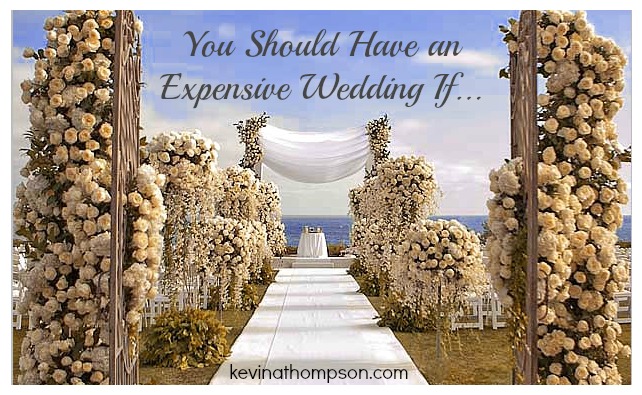You should have an expensive wedding if:
- you want one
- you can afford it
- you saved for it
- all other financial obligations are taken care of
But if one of those characteristics is not part of your story, you should tone the wedding down. (See: The Wedding Predicts the Marriage)
After a decade of performing weddings, I have seen a slight correlation between the expense of the wedding and happiness over the wedding. It is not a significant correlation, but the price does slightly influence the experience. The more expensive the wedding, the less likely a couple will be happy with the event.
I’ve performed some expensive weddings. Several of those weddings were amazing experiences which reflected the love between the bride and groom. Yet several of those weddings have had little to do with marriage and were mainly about putting on a show for friends and family. They created strife, caused debt, and weakened the foundation of the young marriage.
Imagine—the wedding can actually hurt the marriage.
When a couple is more worried about appearances than substance, they focus on everything that doesn’t matter. They worry more about flowers than commitments, menus than vows, things than people. In this instance the wedding can hurt the relationship.
So what type of wedding should you have? (See: Do This Before You Put a Ring On It)
Am I saying no one should ever have an expensive wedding? No.
Am I saying an inexpensive wedding is preferred? For me it is, but it doesn’t have to be for you.
There is only one rule of what type of wedding you should have—one you can afford. (See: 10 Questions About Money)
If you can afford it, you can have it. While I prefer a less expensive wedding, I have no problem with someone spending hundreds of thousands of dollars on a wedding if they can afford it.
However, you should never borrow money for a wedding. You should never create financial strain for yourself or your family for a wedding.
When something can be done for free (and it can, some of the best weddings I’ve done have been in the living rooms of families), there is no reason to harm one’s financial well-being. (See: When a Wedding Goes Wrong)
I realize many people, especially little girls (and mothers of the bride) dream of big weddings. Those are great dreams and it is perfectly acceptable to make one’s dreams come true. But it is only acceptable if you can afford it.
If you can’t, don’t try. (See: Dead Butterflies, Runaway Brides, and Arriving Late for a Wedding)
So if you want a big wedding, but do not have the means to make it happen, you have two choices:
1. Delay the wedding and start saving. If the wedding is that important to you, wait for it. Figure out the expense and make a plan to start saving. When you get the money, set the date.
2. Change your expectations and get married. A simpler approach would be to simply change your expectations. Expensive weddings aren’t more memorable. Find what is important to you, spend money on that and save on everything else.
What I would recommend is a combination of the two. Change your expectations, get married, but start saving for a major anniversary trip or a renewal of your vows in which you can have the wedding you always wanted. If you do it this way, you will likely appreciate it much more.
If you want an expensive wedding, have one. Just do not hurt yourself or your family in doing so. And if you have an expensive wedding, be careful. When a lot of money is being spent, it is easy to put more focus on the show than the marriage. A wedding is supposed to be about a public expression of love and devotion. As long as the relationship stays central, the amount of money spent won’t greatly matter.
For more, see:




2 Responses to You Should Have an Expensive Wedding If…